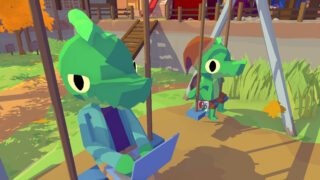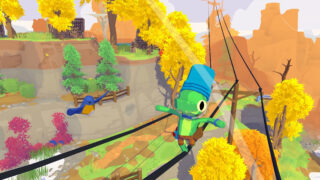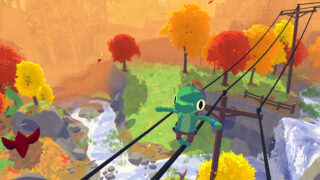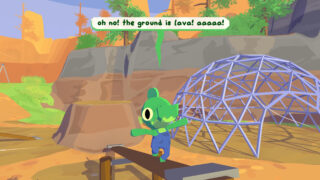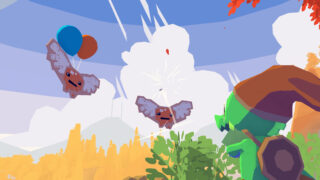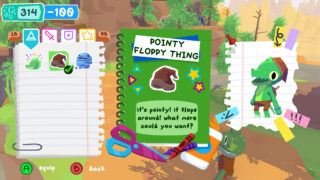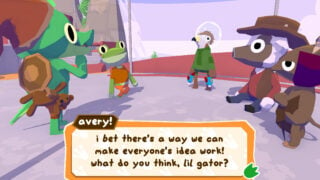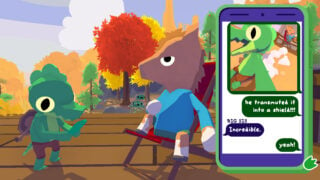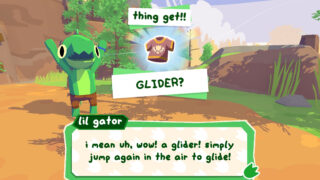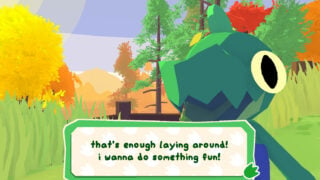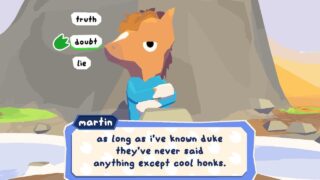Lil Gator Game is a wholesome platformer that will give you a toothy grin
This 3D platformer is flawed but funny, and full of charm
- Director
- Connor Quinn
- Key Credits
- Scott Slucher (Lead developer), Robin Burgess (Composer)

Many of us long for the time we spent as children playing with our friends and making up stories as we went along. That’s the driving principle behind Lil Gator Game, a new platformer published by Yooka-Laylee developer Playtonic’s indie label, Playtonic Friends.
Players take on the role of the titular alligator (who can be named by the player), a child who wants to play with their older sister but can’t because she’s too busy with her university coursework.
In an attempt to convince the sister to put her studies away and join them, the Gator teams up with their friends to make up a new adventure game, one with the overall aim of building their own village in the middle of a forest, one so cool that big sis won’t be able to resist being charmed and joining in the fun.
Over time, all the other animals on the island decide to take part in the game, meaning almost all of the side quests involve performing tasks for different animal residents, in order to convince them to move to your play village and help build it into something even more impressive.
After a brief mission on a smaller island, you cross the river to the main island, and that’s where the rest of the game takes place. The general core of the game’s structure revolves around three ‘hub’ locations, each with three main kids whose needs have to be met. Once all three kids are satisfied in one location, they’ll agree to come to your village and add a chunk to it.
Gather the kids from all three hubs, and your village is ‘complete’. All that remains after that is to upgrade each part of the village. There are other animals in the forest, and when you finish side-quests for them, they also head to the village. Once you have enough villagers, the upgrades can be triggered.
In all, you’re looking at around 30-40 main missions and side-quests to complete the game, but most of these are extremely short and involve things like destroying the ‘enemies’ (cardboard standees) around a villager, or finding something they dropped a few meters away.
Most of the challenge in the game, then, is finding these villagers – and the three hubs in particular – in the first place, and this is where some players may bounce off Lil Gator Game.
The island is reasonably large and there’s no in-game map to bring up, nor does the game let you track your side-quests or remind you what you have to do next, aside from listing the main animals you still have to help (which is rather meaningless since you won’t recognise their names).
With no on-screen indicators to tell you where to go or what to do next, the game appears to encourage exploration rather than spelling everything out for the player. There isn’t anything inherently wrong with this, but it may frustrate some players (particularly younger ones) who have been conditioned to expect this as a standard in today’s adventure games.
“With no on-screen indicators to tell you where to go or what to do next the game appears to encourage exploration rather than spelling everything out for the player.”
Another potential reason for the lack of signposting is that it would be completely lacking in challenge otherwise. This is an extremely laidback adventure in which it’s impossible to get a single scratch, let alone die – there’s no fall damage, you can’t drown, and there are no real enemies, only cardboard ones.
The only semblance of challenge, therefore, is in exploring the island’s nooks and crannies to find the villagers. What’s more, the game is pretty short as it is – we reached the credits in around 4-5 hours – and if we knew where we were supposed to be going, we would have easily halved that time at least.
That’s not to say Lil Gator Game should be dismissed, however. For one thing, the game has some of the most entertaining writing we’ve seen in a long time.
A lot of indie games try too hard to be offbeat and come across as irritating as a result, with countless unfunny ‘jokes’ jammed in, getting in the way of any progress as you sit there putting up with the video game equivalent of an amateur stand-up who doesn’t realise they’re bombing.
Lil Gator Game is the complete opposite – a game that still tries to throw in laughs as often as it can, but actually succeeds the vast majority of the time. Its humour is silly and childish but cleverly written, and we laughed plenty of times throughout our short time with it.
It’s this charm that carried us through to the end, and brought us to its lovely, heartfelt ending, one that will particularly strike a chord with anyone with a sibling. The overall result is a game in which you don’t have to look too far to find flaws (somewhat ironically), but one that – like any sibling – makes up for these flaws by just being fun to be around.
As long as you don’t mind a bit of mindless and aimless wandering, Lil Gator Game is a laid back and relaxing platformer (if a short one) that’s ably carried by its brilliantly funny dialogue.
- Legimitately funny writing from start to finish, with a charming end
- A nice selection of fun customisation options
- No threats whatsoever (if you like that)
- No threats whatsoever (if you don't like that)
- Complete lack of signposting can make exploration frustrating
- It's pretty short for its $20 price tag
